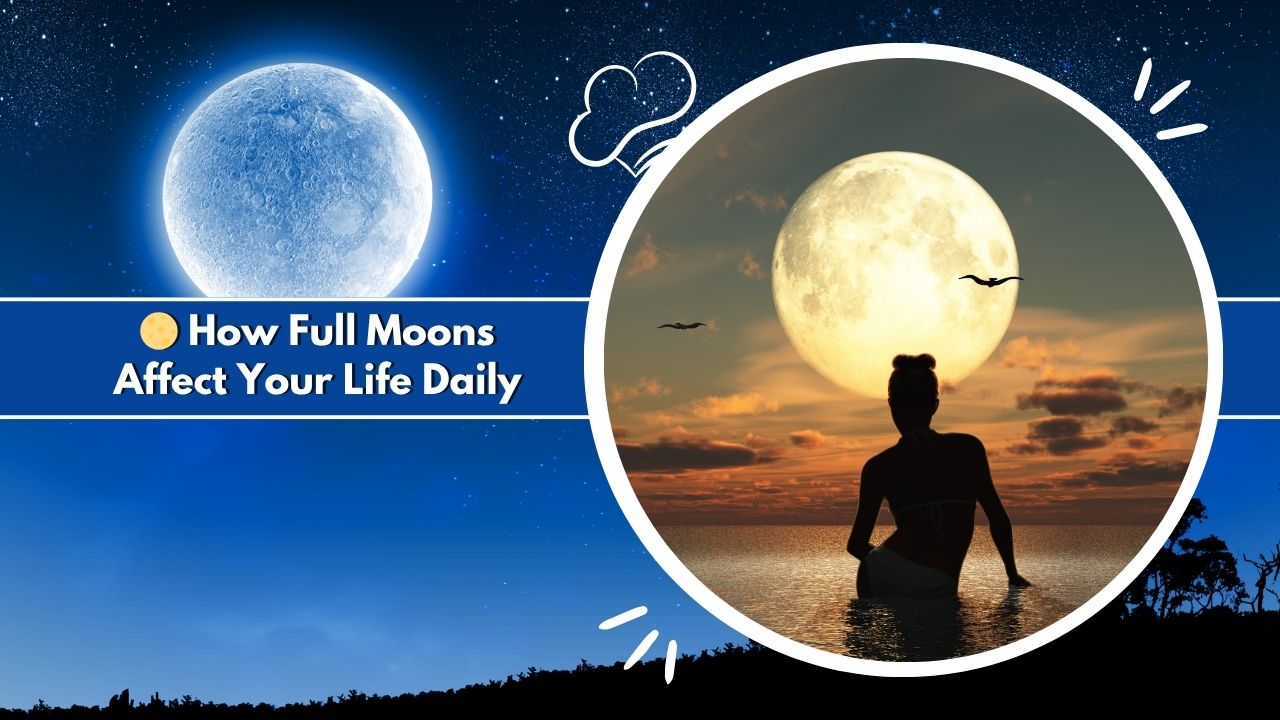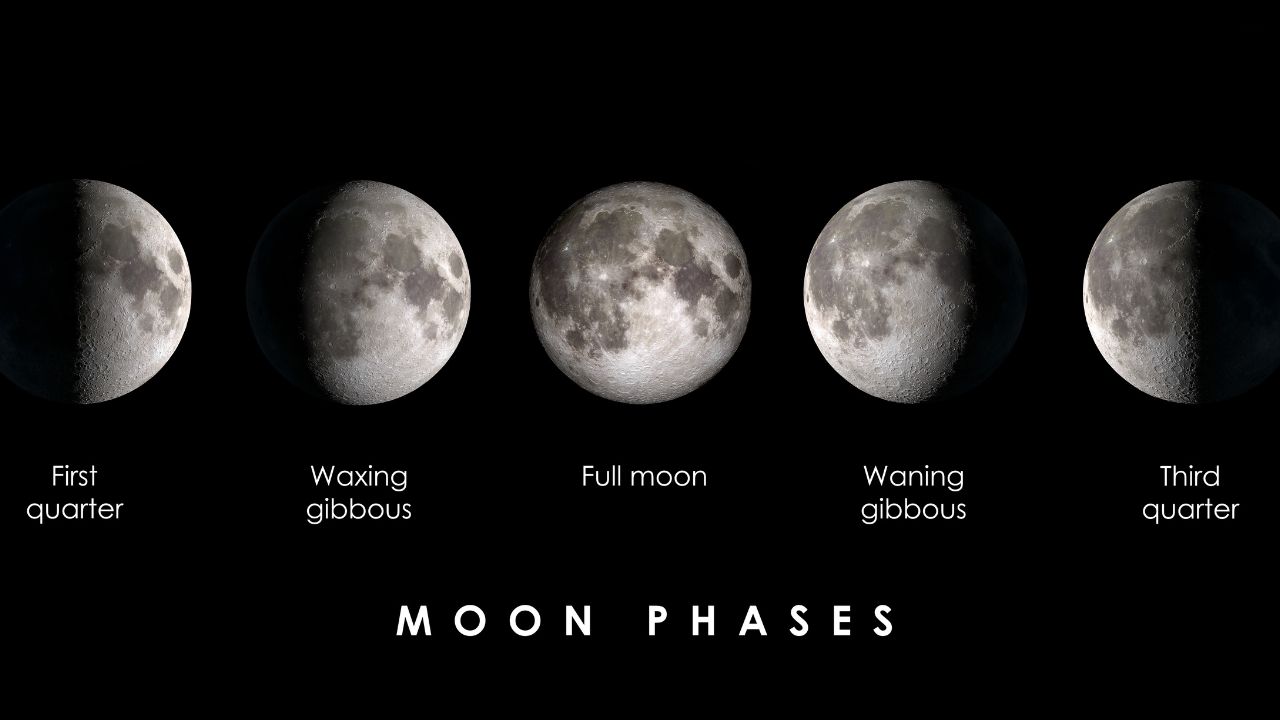
The full moon has captivated humanity for millennia, weaving its way into folklore, mythology, and deeply held beliefs about its influence on everything from human behavior to natural phenomena. While scientific consensus often debunks dramatic claims, a nuanced look reveals that the full moon, and indeed the entire lunar cycle, might subtly impact our daily lives in ways both perceived and proven.
This article will delve into the multifaceted relationship between the full moon and human existence, exploring historical perspectives, anecdotal observations, and current scientific research. We aim to provide a comprehensive understanding of how this lunar event might affect your sleep, mood, physical well-being, and even the natural world around you, while also separating verifiable facts from enduring myths.
The Full Moon: A Celestial Overview
The full moon occurs when the Moon is directly opposite the Sun in its orbit, meaning the entire face of the Moon visible from Earth is illuminated. This happens approximately once every 29.5 days, marking the peak of the lunar cycle. Throughout history, this bright, luminous orb in the night sky has been a source of wonder, inspiration, and sometimes, apprehension.

Historical and Cultural Significance
Across diverse cultures, the full moon has been imbued with profound meaning:
- Ancient Civilizations: Many ancient societies revered the Moon as a deity. The Greeks had Selene, the Romans Luna, and various indigenous cultures integrated lunar cycles into their spiritual practices and understanding of nature.
- Folklore and Mythology: Tales of werewolves, witches, and heightened supernatural activity under the full moon are prevalent in European folklore. The very word "lunacy" derives from "Luna," reflecting a long-held association between the moon and mental instability.
- Agricultural Practices: Farmers historically looked to lunar phases for guidance on planting and harvesting, believing the Moon's gravitational pull influenced plant growth and soil moisture.
- Spiritual and Ritualistic Practices: Many spiritual traditions today continue to observe full moon rituals, often focusing on release, manifestation, and emotional cleansing.
Unpacking the "Lunar Effect": Science vs. Anecdote
The concept of a "lunar effect" – where lunar cycles directly influence human health and behavior – is a topic of ongoing debate. While popular belief, especially among some healthcare professionals, often attributes a rise in unusual occurrences to the full moon, scientific evidence remains largely inconclusive or points to very subtle influences.
The Gravitational Pull: Tides and the Human Body
One of the most commonly cited reasons for the Moon's supposed influence is its gravitational pull. It's undeniable that the Moon's gravity is the primary driver of ocean tides, causing the rise and fall of sea levels. During a full moon (and new moon), the Sun, Earth, and Moon align, creating stronger "spring tides" with higher highs and lower lows.
The human body is largely composed of water, leading some to speculate that the Moon's gravitational pull could similarly affect the fluids within us, impacting blood pressure, brain activity, or even mood.
Scientific Stance on Gravitational Impact on Humans: While the Moon's gravitational pull is significant enough to move oceans, its effect on a relatively small body like a human is infinitesimally small. The gravitational force exerted by a nearby building or even another person is far greater than that of the Moon. Most scientific studies have found no evidence to support the idea that the Moon's gravitational pull directly influences human physiology to cause significant behavioral or health changes.

Sleep Patterns: A More Tangible Link?
Perhaps the most compelling area where the full moon might subtly affect daily life is in its influence on sleep. Several studies have explored this connection, with some intriguing findings.
- Reduced Sleep Quality and Duration: A 2013 study published in Current Biology found that people slept, on average, 20 minutes less and took longer to fall asleep during the full moon phase, with reduced deep sleep (NREM sleep) and delayed REM sleep onset. These changes were also associated with decreased melatonin levels, a hormone crucial for regulating the sleep-wake cycle.
- Increased Light Exposure: Historically, before widespread artificial lighting, the full moon was a significant source of nocturnal illumination. This increased brightness could have subtly disrupted natural circadian rhythms, making it harder to initiate and maintain sleep. Even today, subtle light penetration through curtains or windows during a bright full moon could potentially interfere with sleep for sensitive individuals.
- Individual Variability: It's important to note that not everyone experiences these sleep disturbances, and the effects can vary significantly between individuals. Some people may be more sensitive to environmental changes, including lunar cycles, than others.
Mood and Mental Health: Complex and Contradictory Evidence
The belief that the full moon influences mood and mental health is deeply ingrained in popular culture, often linked to increased agitation, aggression, or even "lunacy." However, scientific research in this area presents a more complex and often contradictory picture.
- No General Link to Aggression or Crime: Numerous studies investigating the correlation between full moons and crime rates, psychiatric hospital admissions, or aggressive behavior have largely found no significant link. In fact, some studies have even reported a decrease in certain incidents during the full moon.
- Bipolar Disorder and Lunar Cycles: While not a general effect, some limited research, including a small 2018 study, suggests a potential synchronicity between rapid cycling in individuals with bipolar disorder and the lunar cycle. The exact mechanism remains a mystery, but it hints at a possible susceptibility in certain clinical populations.
- The "Confirmation Bias" Effect: The persistence of belief in the full moon's influence on behavior, especially among some professionals, can be partly attributed to confirmation bias. When unusual events occur during a full moon, they are more readily noticed and remembered, reinforcing the belief, while similar events on other nights might be overlooked.
Physical Health: Limited Evidence
While anecdotal reports often link the full moon to various physical ailments, scientific evidence for a direct causal relationship is scarce.
- Blood Pressure and Heart Rate: A 2013 study on male university students observed a slight reduction in blood pressure and heart rate during both new and full moon phases, and faster recovery of heart rates after exercise. However, these were minor physiological changes and their clinical significance is unclear.
- Birth Rates: The idea of increased births during a full moon is a persistent one in labor and delivery wards. Some recent research, including a large 2021 study in France, found minor but statistically significant increases in births around the full moon, aligning with folk beliefs. However, the exact mechanisms behind this, if truly lunar-related, are not fully understood.
Animal Behavior: More Observable Patterns
Unlike humans, some animal species exhibit more observable behavioral changes in sync with lunar cycles, often related to light levels or reproductive timing.
- Nocturnal Activity: Many nocturnal animals alter their activity patterns based on moonlight intensity, using the darkness of new moon nights for hunting and the brightness of full moon nights for different behaviors or avoidance.
- Reproduction and Migration: Certain marine species, like coral, time their spawning to specific lunar phases, and some birds rely on the moon for migratory navigation.
The Psychological and Energetic Impact
Beyond direct physiological effects, the full moon often carries a strong psychological and energetic significance for many people.
Heightened Emotions and Sensitivity
Many individuals report feeling more emotional, sensitive, or restless around the full moon. This heightened state could be attributed to:
- Subtle Sleep Disruption: Even minor sleep disturbances can impact mood and emotional regulation, making individuals feel more irritable or prone to emotional swings.
- Collective Consciousness: The widespread belief in the full moon's influence might create a collective psychological effect, where individuals are more attuned to and interpret their experiences through a "lunar lens."
- Symbolic Power: For those who engage in spiritual or reflective practices, the full moon represents a culmination, a time of heightened energy, and an opportunity for introspection and release, which can naturally lead to more intense emotional experiences.
A Time for Release and Manifestation
In many spiritual and self-help circles, the full moon is seen as a powerful time for:
- Releasing What No Longer Serves You: The full, illuminated moon symbolizes clarity and completion, making it an ideal time to reflect on what you want to let go of – old habits, negative emotions, limiting beliefs.
- Celebrating Accomplishments and Gratitude: It's also a time to acknowledge growth and progress since the new moon, practicing gratitude for what has manifested.
- Manifestation and Intention Setting: While new moons are often associated with setting new intentions, full moons are considered powerful for bringing existing intentions to fruition or for charging objects with energy.
Harnessing Full Moon Energy for Well-being
Even if the scientific evidence for dramatic effects is limited, recognizing the psychological and energetic impact of the full moon can be a powerful tool for personal growth and well-being.
Practical Tips for Full Moon Sensitivity
If you find yourself feeling more sensitive or experiencing sleep disturbances around the full moon, consider these strategies:
- Prioritize Sleep Hygiene: Create a dark, quiet, and cool sleep environment. Avoid screens before bed, and stick to a regular sleep schedule. If moonlight is an issue, invest in blackout curtains.
- Practice Mindfulness and Self-Awareness: Pay attention to your emotions without judgment. Journaling your feelings around the full moon can help you identify personal patterns and better understand your reactions.
- Engage in Calming Activities: Incorporate relaxing practices like meditation, deep breathing exercises, gentle yoga, or a warm bath into your routine.
- Spend Time in Nature: Connecting with the natural world, perhaps by taking a mindful walk under the moonlight (if safe and appropriate), can be grounding.
- Stay Hydrated and Nourished: Support your body with healthy food and plenty of water, especially if you feel more prone to emotional fluctuations.
Full Moon Rituals for Personal Growth
Many people find comfort and empowerment in performing full moon rituals. These are personal practices, but common themes include:
- Full Moon Release Ceremony: Write down on a piece of paper anything you wish to release (fears, old habits, grudges). Safely burn the paper (in a fire-safe dish) or tear it up, visualizing these things leaving your life.
- Gratitude Practice: Reflect on all the things you are grateful for, especially those that have come to fruition since the last new moon.
- Crystal Cleansing and Charging: Place your crystals under the direct moonlight overnight to cleanse them of old energies and charge them with the full moon's energy.
- Moonlight Meditation: Sit quietly under the full moon, allowing its light to wash over you. Focus on your breath and set intentions for what you wish to bring to culmination.
- Salt Bath Ritual: Add Epsom salts and essential oils to a bath, visualizing yourself releasing tension and negativity as you soak.
Debunking Common Full Moon Myths
It's important to differentiate between widely held beliefs and scientifically supported facts. Many dramatic claims about the full moon are not supported by robust research.
- Myth: The full moon causes a significant increase in crime or violence.Reality: Extensive studies have repeatedly found no consistent correlation between lunar phases and crime rates or aggressive behavior.
- Myth: The full moon makes people "crazy" or significantly increases psychiatric emergencies.Reality: While the term "lunatic" persists, most scientific research does not support a general increase in mental health crises during the full moon, with the possible exception of subtle effects in very specific conditions like rapid-cycling bipolar disorder.
- Myth: The full moon causes major natural disasters or catastrophic events.Reality: While the Moon's gravity influences tides, there is no scientific evidence to suggest it directly triggers earthquakes, volcanic eruptions, or other large-scale natural disasters.
- Myth: Menstrual cycles are perfectly synchronized with the lunar cycle for all women.Reality: While the average menstrual cycle is around 28 days, close to the lunar cycle, research has shown no consistent synchronicity for the majority of women. Individual cycles vary widely.
Frequently Asked Questions about the Full Moon
Conclusion
The full moon, with its radiant glow, undeniably holds a powerful place in the human psyche and across various cultures. While the dramatic "lunacy" claims often lack scientific backing, a closer look reveals that the full moon might exert subtle influences on our sleep patterns and, for many, acts as a potent energetic and psychological marker.
Understanding the interplay between anecdotal experience, cultural beliefs, and scientific inquiry allows for a more balanced perspective. Instead of fearing the full moon, we can choose to view it as a recurring opportunity for self-reflection, emotional release, and conscious alignment with the natural rhythms of our world. By tuning into these subtle energies and incorporating mindful practices, the full moon can indeed become a supportive force in our daily lives, empowering us to let go of what no longer serves us and to embrace our fullest potential.